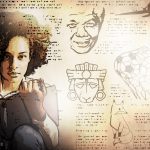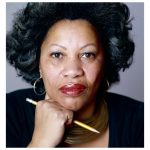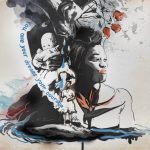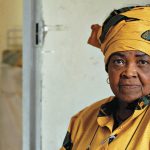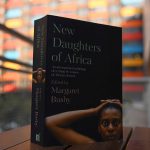A collaborative tribute to Toni Morrison
The prizewinning writer lives on through the writers she has inspired, who were once the readers she held enthralled.
Author:
12 August 2019

Toni Morrison died on 5 August at the age of 88 as a result of pneumonia-related complications. In 1993, she became the first African-American woman to receive the Nobel Prize for Literature and she won a Pulitzer Prize in 1988 for her classic work Beloved. Morrison was a towering literary figure. New Frame asked writers who were influenced by Morrison to share what her work meant for them.
She lives on in her work
By TO Molefe
The study of my parents’ house has always been filled with books. My mother was an English major and my dad a psychologist. That’s why I’m a writer, to turn a line from a liberation workers’ song middle-class. They were big and important books, placing such weight on the long, white built-in shelves that they sagged.
Plato’s The Republic. Van Sertina’s They Came Before Columbus. Plaatje’s Native Life in South Africa. Du Bois’ The Souls of Black Folk. Achebe’s Things Fall Apart. Hardy’s Tess of the d’Urbervilles. Brontë’s Wuthering Heights. And everything Baldwin had ever written, except Giovanni’s Room.
This list that I’ve pulled from memory fills bare barely a tenth of a single one of the five, long shelves.
Related article:
Later, a new edition of Biko’s I Write What I Like would be added and placed next to Mandela’s Long Walk To Freedom, suggesting that my parents might have had a sharp sense of irony. Or they had, in that way people do as they age, grow into conservatism, “balancing both sides”. (It turned out to be the former for my mother, and the latter for my father).
Toni Morrisson, “Ma”, as many South Africans called her, as I call my own mother, did not succumb to the conservatism of age, even at 88, when she left the land of the living. She could not afford to.
Twelve-year-old Tamir Rice was shot a few miles from where Morrisson grew up, as was John Crawford III, for the crime of being black. It was Morrisson’s childhood again. The childhoods of too many black Americans.
Morrisson did not chastise young activists for their reprising of actions that she and her generation had employed when they were young. Instead she had gifted them, gifted us, intellectual tools to complete what older generations had not and, perhaps, could not; to understand our realities.
Ma fed our minds and took care of us. She was our mother.
Related article:
I found her for the first time in my mid-teens, thumbing the spines of the books on the two shelves of the study I could reach. She, in the form of The Bluest Eye, appeared on the shelf, surprising me. The book was unlike any of the others there, so unlike them that I wondered if it belonged or if there had been a mistake.
A black author. Sure. A black author writing fiction. Okay, maybe. But a black woman writing fiction? I gobbled down the book and sought out everything she’d written. Since then, black women form much of who I read. For I feel understood, an unsettling, creepy feeling.
It’s always distressing when figures like Morrisson die, figures who’ve guided, led and fed us. There’s a sense of loss and being stolen that we cannot shake, even though she lived for almost nine decades. But shake it we must. Morrisson did her work and continues to live through it. We will never be without her.
Robala sentle, Ma. Sleep well.
TO Molefe is an editor and writer.
You’ve been gone too long, Sula
By Lethabo Mailula
Toni Morrison’s palm has always rested at the nape of my neck as a compass and source of guidance. The first time I picked up Beloved, I had to reconsider what lay within the parameters of what I had come to know as love. I have come to understand what love looks like when you’re a black woman living in a world that hypersexualises you, robs you and steals from your womb. I have had to rationalise what lengths a mother would go to protect her children. I have escaped to worlds that she has built, not as a voyeur but to someone who has owned a world and has placed us into that world.
Morrison has challenged the ways in which I have experienced reading and made me understand that reading is a project of excavation, of completely inserting oneself into a world that may be terrifying. Then there comes the realisation that the world is terrifying when you’re the young black girl with no place to belong.
There are lessons in loving but I think through the pieces I have gathered, the greatest lesson that Morrison has lent to little black girls is to love oneself. This manifested itself through the intentional manner in which black lives and black experiences were, for once, the centre of the story. The voices were not monolithic but varied, like the introduction of different instruments in the progression of a jazz song.
Related article:
It was not merely reading a book, it was viscerally receiving words as if they had fallen off your grandmother’s lips and you could not afford to let any one of those utterances slip through your fingers and drop to the ground.
Although not writing necessarily for a black African child, one has to recognise the parallels in the manner in which Morrison weaves a story that may kick you and leave you floundering or delight you in a salacious manner. I would like to picture the feet of little girls dancing on the feet of a giant, to the words that were written for her. I have come to appreciate this woman as a friend of my mind.
Morrison has said all that she had to say and in this regard, death does not feel like a thief. A struggling writer will remember that they owe nobody a book that centres on those who do not look like herself. She will remember that they must not wait on another to write the book they have always wanted to read. She will remember to excavate herself and bring from within herself the love for her identity and write that love for others.
Robala, sleep, we’ve got it from here.
Lethabo Mailula is an activist, writer and gender studies teacher.
No Lies
By Mohale Mashigo
No lies. That’s one of my writing rules. So, here is a small truth. I read Beloved twice before I truly understood what Sethe and Toni Morrison had done. A woman somewhere far away changed the life of a lonely and depressed teenager. She would never know me by name but I would keep her tucked away safely in the soft places of my soul. That’s what words do, right? They make family of strangers, fictional and real.
I was a novice writer when I took refuge under the Morrison Tree. Sometimes the tree fed me and other times it shook me out of its branches. I tripped over its roots and occasionally left dents in its spine – carving hearts and missives to my future self.
No lies. I think it’s too soon for me to fully express the what and why of my love for Morrison. Grief has blurred things that should otherwise be easy to describe. The person who gave me the music of language is gone and perhaps the words have left with her. Not forever, but just to sit with her a while and thank her for making them dance, weep, soar, shock and LIVE. When the words return, and they will, we will hug them and they will still smell like her.
The tree still stands but it will never bear fruit. We will sit under it – a different kind of fruit. Novice writers will still take refuge under the tree; reading and marvelling at our hearts and missives.
No lies. There would never have been a good enough goodbye. There is a Mohale, because there was a Toni.
“A writer’s life and work are not a gift to mankind; they are its necessity.” – Toni Morrison
Mohale Mashigo is an award-winning novelist. Her debut novel The Yearning won the 2016 University of Johannesburg Prize for South African Debut Writing and has been longlisted for the International Dublin Literary Award 2018.
For Toni
By Lebohang Masango
When I was 14 years old, just passing the time in my floor prefect’s room, I came across a white book with black lettering and three blue marbles in the centre: The Bluest Eye. I borrowed it and began my first journey into a world of rich language and imagery, a world where a little girl had struggled with the implications of racialisation in a way that I feel is familiar to black girls of my generation. Just like Pecola, I had been perplexed by race as a phenomenon, in my own childlike manner, and The Bluest Eye spoke to that experience in a way that was so affirming. It felt like a hug.
At the dying of someone great, Maya Angelou wrote a poem called We Had Him. She wrote:
Beloveds, now we know that we know nothing
Now that our bright and shining star
Can slip away from our fingertips
I love poetry and I think of Toni Morrisson in the same way. We held her. Sula. Violet Trace. Milkman Dead. Bride. Morrisson has given us worlds of such memorable and complicated characters. She taught me that it is okay to give the world art that is difficult and it is okay to be challenged as a reader. My capacity for appreciating the true meaning of the lives of her characters grows exponentially each time I read her. She is the kind of writer who has to be read over and over again, and each time I do, I am rewarded with more understanding and awe for her immense brilliance.
Related article:
We heard her. Over countless interviews, Toni held her line. She declared, in her powerfully quiet voice, that black people were the centre and our stories the mainstream. No matter how her stature grew and small voices in the periphery sought to make issue of who her audience was, she never cowered or wavered. With just the reminder that “racism is a distraction”, I find myself able to release the urge to fight and to focus on my peace of mind instead. In the era of hyper-exposure to so many hateful views on the internet, that reminder is a beautiful gift.
She reminds me to hold my convictions and give my best to my gift, so it can give its very best to me. She gave us stories, worlds and words to live by. She reminds me that I am my best thing and I feel truly honoured to have shared this lifetime with someone so astoundingly great. Morrison has challenged me to just be better, in all ways. We had her and she had us.
Lebohang Masango is an anthropologist and the author of the children’s book Mpumi’s Magic Beads.
What words do, what words mean
By Fezokuhle Mthonti
There are many words. Difficult words. Words that wound and dehumanise. Words that marginalise and break. Words that kill off and destroy.
Words that are simply not true. These words animate the life worlds of Herman Mashaba’s Johannesburg, Trump’s America, Bolsonoro’s Brazil and Modi’s India. They are words of the powerful seeking to break the only claim to humanity that the vulnerable might have.
It is difficult to make sense of a world in which these words hold the public terrain hostage and make no room for words that might wake us, roil us or perhaps even call us into action. In the absence of Toni Morrison’s physical presence, it is important to recover and restore the words she used to contest space in an increasingly divided world.
Beyond the exquisite pen she used to write her fictional novels, this is what Morrison’s legacy is for me. A call to action.
Related article:
As Morrison so deftly says, “Oppressive language does more than represent violence; it is violence; does more than represent the limits of knowledge; it limits knowledge. Whether it is obscuring state language or the faux-language of mindless media; whether it is the proud but calcified language of the academy or the commodity-driven language of science; whether it is the malign language of law-without-ethics, or language designed for the estrangement of minorities, hiding its racist plunder in its literary cheek — it must be rejected, altered and exposed.
“It is the language that drinks blood, laps vulnerabilities, tucks its fascist boots under crinolines of respectability and patriotism as it moves relentlessly toward the bottom line and the bottomed-out mind. Sexist language, racist language, theistic language – all are typical of the policing languages of mastery, and cannot, do not permit new knowledge or encourage the mutual exchange of ideas.
Fezokuhle Mthonti writes about art and culture for New Frame.
More than a writer
By Ntombizikhona Valela
There is no writer worth their salt who wouldn’t cite Toni Morrison as an influence. For black people Morrison was more than a writer, she was a monument. The very thing she wished to create through Beloved, she became. She became the bench; a place of pause, a place of literary rest for black people fighting for their humanity.
At times we do not heed Morrison’s words concerning racism. We find ourselves distracted, writing back to the empire, writing back to whiteness when there is so much work black writers and readers alike need to do regarding healing, regarding claiming our rightful place in history. Perhaps more than James Baldwin, more than Steve Biko, more than Frantz Fanon, Morrison was among those who refused to indulge the white gaze even as it loomed over the histories of black life as reflected in Song of Solomon.
Morrison had this supernatural gift of creating the centre at the margins where history had tossed all our blackness.
Related article:
She made black people, and black women in particular, the centre. She made us the sun around which everything revolves. And the rest of the world had no choice but to dance to the rhythm, inflection and cadence of Morrison’s pen. She did not ask for anyone’s permission. The story of Margaret Garner as retold through Sethe is a guiding light in how I write about a woman like Winnie Madikizela-Mandela.
Morrison’s reimagining of a woman’s choice to liberate, as brutal as it may have been portrayed in the public sphere, offered an important balance to what it means to be a mother in the midst of a coming revolution, what it means to be a black woman at the height of heinous crimes committed against black people.
Her work is call and response. Though we all have access to it, Morrison’s literary genius lies in the fact that she writes in a vocabulary to which only a few of us know how to respond. And her writing demands that you respond. She writes to the Pecolas inside so many black women who were convinced that their eyes were not enough. She writes for the black men like Milkman searching for flight.
Ntombizikhona Valela is a historian.

